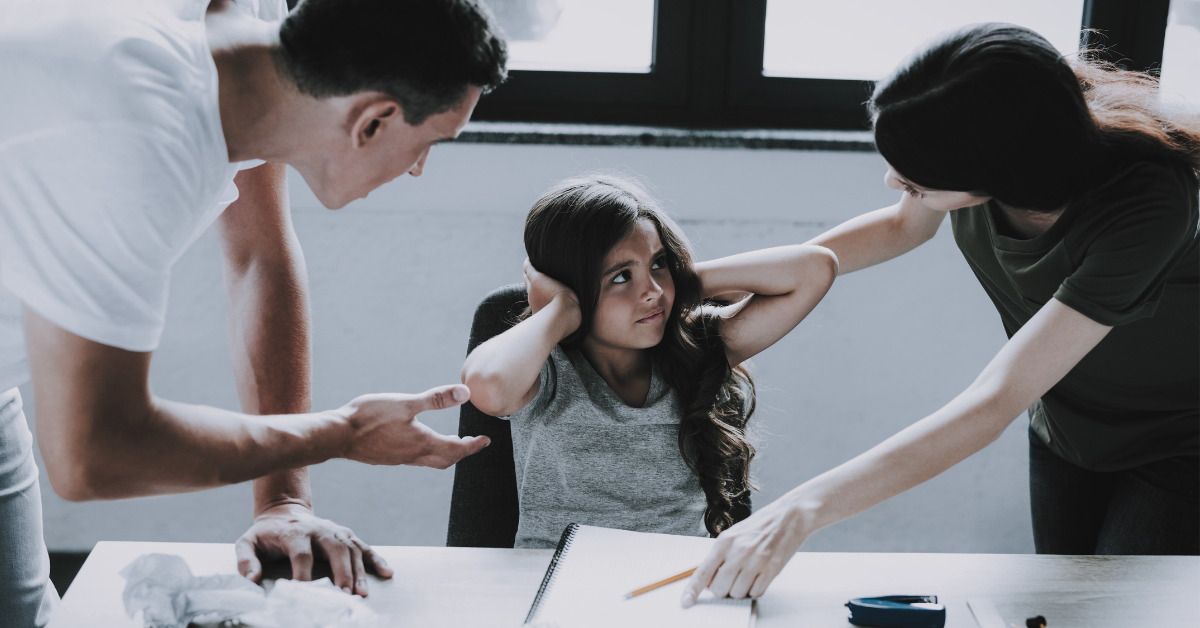
How To Stop Yelling
Kids do things every day that are irritating, obnoxious, loud, and frustrating. It drives us, quite literally, a little crazy…and we yell. Yet, we’re at our parenting worst when we yell. You want to stop yelling at your child, but it’s not as easy as a simple choice.
I’m here to tell you that it is possible to yell less and when you do, it improves your relationship with your child. We will talk about how to do that in both the short term and the long term. It takes practice and a willingness to be a little brave/uncomfortable.
You can’t be perfect—meaning that you will be human and mess up from time to time—but can reduce your yelling.
Why Stop Yelling
Some people might wonder, why is yelling so bad? You may have a partner who wonders why yelling is so bad. Adults all over the world shout at kids and it can appear to “work” in the short run—meaning your child will sometimes obey—but ultimately it’s ineffective in the long term and short-term.
\When we yell, we scare our kids. It instantly triggers their fight-flight-or-freeze stress response—the sympathetic nervous system. This instant biological response cuts off access to their upper brain, making it so they cannot learn whatever it is you want them to learn in that moment. If we want to teach them better behavior, they can’t learn it—because their nervous system has registered you, the big, shouting parent, as a threat.
This involuntary, sympathetic nervous system response is also responsible for many of the behaviors we see as “bad.” Fight, flight, or freeze can look like yelling, kicking, spitting, pushing, doing anything to get away, or even holding breath or shutting down. Your kids are not “misbehaving,” they are having a stress response. Not only that, research shows that yelling makes kids more aggressive, physically and verbally.
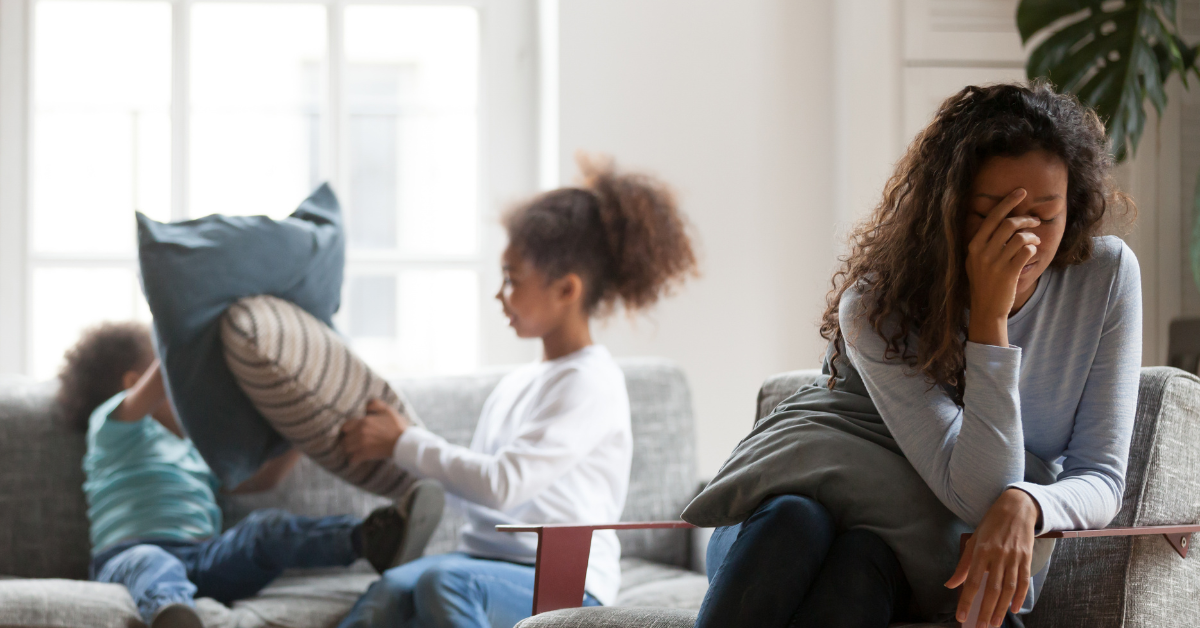
Also, we need to remember that the best parenting is in modeling. Our kids are often terrible at doing what we say, but great at doing what we do. They imitate us. So it’s not surprising that [when we yell, kids yell back (or at their siblings) because that’s the behavior we’ve modeled for them. We’ve shown them that you get your way by shouting.
So we can see that yelling is a pretty unskillful parenting tactic —promoting fear, stress, and resistance in our kids, triggering more “bad” behaviors, and teaching them that yelling is how you get your way. We need to quit yelling, but how?
My Story & Stress Response
There are more effective ways to communicate and I know this because, beyond my masters degree and two intense kiddos, I’m the creator of the Mindful Parenting course, host of the Mindful Mama podcast, and author of Raising Good Humans.
But I don’t teach this because I was naturally great at all of these things. I teach these things because I desperately needed them… I was yelling at my toddler, and I wanted to stop shouting.
My temper came out when my daughter was not even two years old. She was so cute —it’s amazing how angry I could get so quickly. I was screaming in frustration. It was an incredibly hard time because I wasn’t being the parent I wanted to be. I remember sitting in the upstairs hallway, crying big, ugly tears, feeling ashamed, listening through the closed door to my daughter Maggie crying too—because I’d scared her…again with my shouting. I could see that my temper was damaging our relationship and making getting along—motivating cooperation—harder.
This was exactly what I didn’t want because I got my temper from my father, who scared me with his rage when I was little. His temper damaged and strained our relationship for years. I didn’t want to be like my father. I didn’t want to yell. I wanted to practice gentle and peaceful parenting. But how do I stop when inside it feels like a volcano erupting?
(If your goal is to stop yelling, make sure you grab my free resources here.)

I dove into understanding my reactivity, because try as I might to embody peaceful parenting, it all went out the window when I was triggered. Here's not how to be a better parent: learning great ways to respond to my child that I simply couldn’t access in those difficult moments.
Picture a mom yelling at kids: when your kid is driving you bananas, your nervous system is registering your child as a threat, just the same way as our ancient ancestors may have reacted to the proverbial saber-toothed tiger. Even though there is no imminent danger, your nervous system prepares you to fight off a threat or flee to safety by raising your heart rate, tightening your muscles, and more... perhaps screaming in anger.
Just like in our kids, this stress response bypasses the slower parts of your brain to react as quickly as possible. The problem with this is that the parts of the brain that process more slowly are exactly the parts we need to respond effectively to our kids—the rational, logical parts of the brain—namely, the prefrontal cortex which is up behind your forehead.
The prefrontal cortex regulates problem solving, empathy, verbal ability, and impulse control—all the things we need to parent thoughtfully. So when this stress response is happening, it is impairing our parenting ability. We can’t use our whole brain. Even if I learned a better way to respond to my daughter, I couldn't access it when I was triggered because my nervous system was bypassing the slower prefrontal cortex.
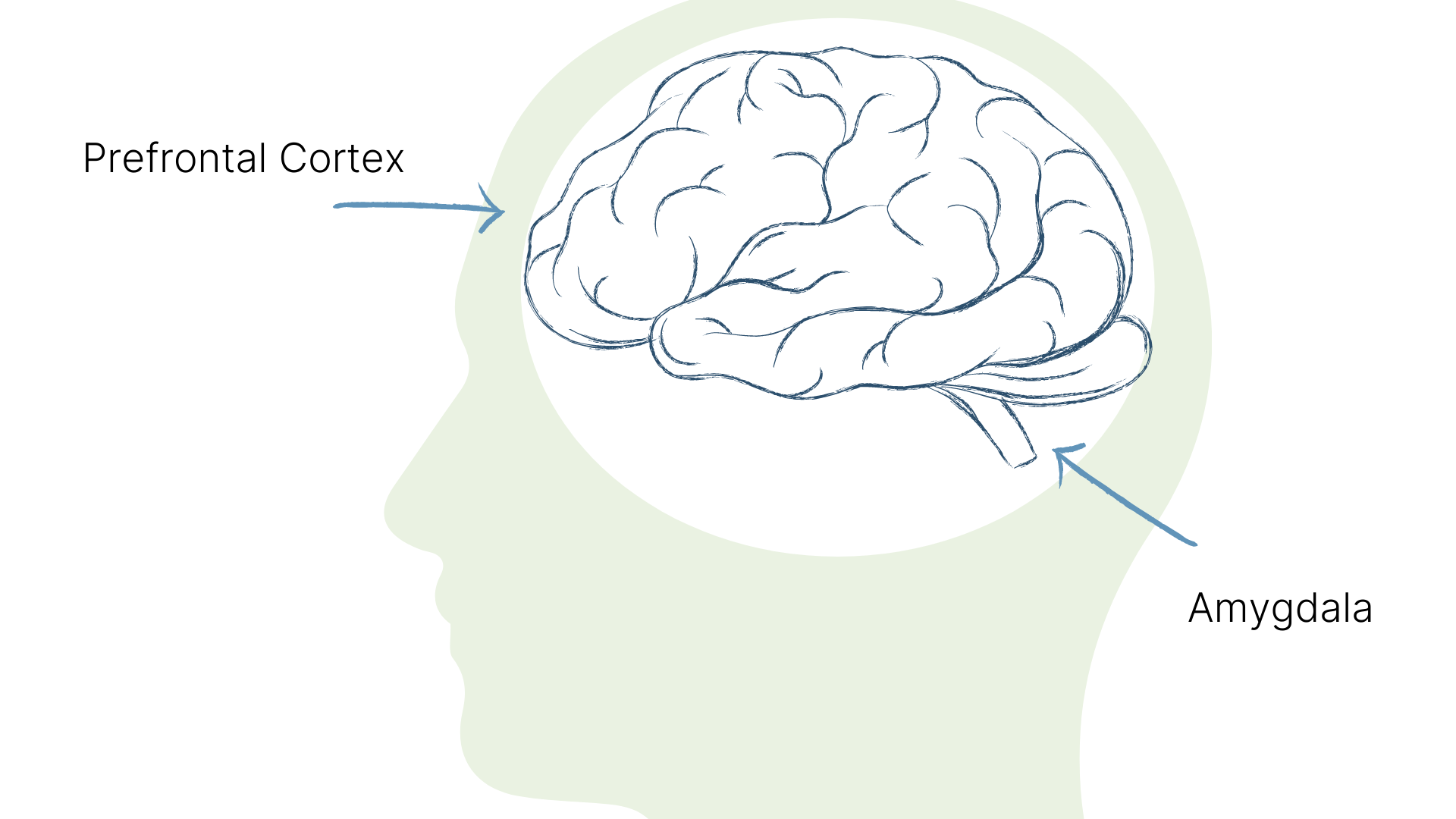
The good news about this is that yelling is not your fault. It’s a stress response—wired into your nervous system. We did not make a conscious choice to lose it—it’s our biology—yet it is our job to calm our reactivity. It's our job to stop yelling at kids.
Yelling is not your fault, but it is your responsibility.
It’s our job to take responsibility for our behavior, and as adults it’s our job to take steps to down-regulate so we can use our whole brain and model calming down for our kids. We have to show them how to do it.
How do we do that? We have to do two things: (1) calm our overall reactivity, and (2) calm our reactivity in the moment.
Calming Overall Reactivity
Calming our overall reactivity is one of the most important factors to reducing your yelling and improving your relationship with your child, ultimately making them more cooperative. What makes a good parent? Ultimately a more relaxed parenting style leads to more relaxed kids. I’m going to share with you three important calm down strategies (aka ways to be a better parent):
- The first is to reduce your overall stress. This may be the best parenting advice you ever receive. That means improving your sleep, getting regular exercise, and having time with supportive family and friends.
We need to remember that self-care is not selfish. When parents ask me how to stop screaming at my child, I tell them that to be less reactive, more responsive parents, we need to prioritize reducing our stress to reduce our reactivity. Taking care of yourself, prioritizing meeting your own needs is the foundation for becoming a kinder, more effective parent.
Sometimes we parents don’t want to do the things we need to do to take care of ourselves. We were taught by misguided traditions that it’s noble to sacrifice our own needs, we were taught not to take care of ourselves. But unfortunately, this leads to burnout, resentment, and a parent yelling at a child.
- For reducing our overall stress, the second tool I want to share with you is mindfulness meditation. This tool has made a life-changing difference in my own life and in the lives of thousands of parents whom I’ve worked with.
Research has shown that mindfulness practices can decrease anxiety, increase emotional intelligence, and, importantly, improve your ability to regulate your emotions.
In fact, mindfulness practices actually change your brain physically! MRI scans have shown that after 8 weeks of mindfulness practice, the gray matter in the amygdala, which is the center of our fight-flight-freeze stress response, actually shrinks—it gets smaller. And the gray matter in that all-important PFC actually grows more dense. A mindfulness practice literally changes your brain, building your pause muscle. So mindfulness is an incredible tool for reducing your reactivity in the long term.
- Thirdly, in the long term it helps enormously to become aware of situations that may trigger reactivity in us.
For example, Mindful Parenting member Sam felt incensed when her toddler spilled juice. It was normal toddler behavior but it produced a huge reaction in her. By doing the work to understand her own upbringing, her beliefs, how she was raised, she realized that an emphasis on perfectionism and appearance in her childhood led to this outsized internal response to the mess—to normal toddler behavior. She had to make her unconscious trigger conscious to be able to deal with it.
For me, I had to understand that if my daughter yelled or got upset, it felt unacceptable to me. I couldn’t tolerate it. Why? Because when I was little and yelled or got upset, my father would yell back at me—louder and scarier. So I learned that those feelings were unacceptable, and as an adult, seeing them in my child, they triggered my own temper. I was repeating the pattern. I could see how these unhealthy generational patterns get passed down. It wasn’t my fault but it was my responsibility. As adults, we have to start to pick up and carry our own baggage rather than pass it on to our kids.
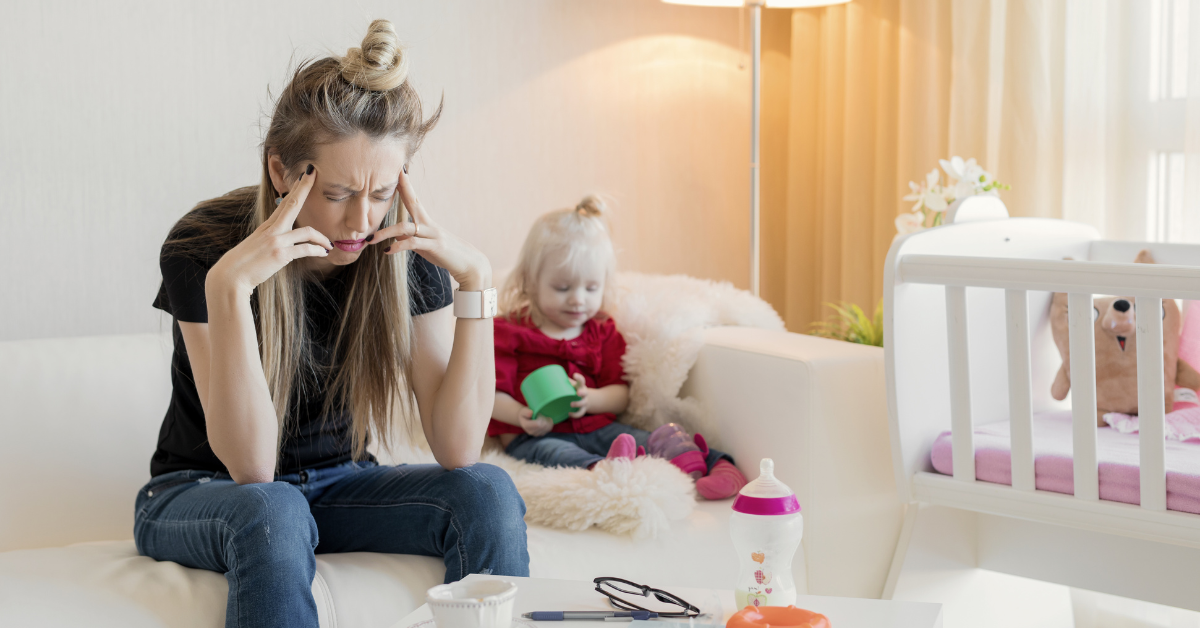
So to yell less in the long term we want to reduce our overall stress, consider a mindfulness practice, and start to dig into why we have outsized reactions.
Great, but what about later today when my kid drives me cuckoo?
Calming In-The-Moment Reactivity
Let’s imagine that you’ve been triggered or you’re having a stress response. What do you do to stop yelling? It comes down to the three R’s: Recognize you’re triggered, Remove yourself, and Resourcing.
- The first, most important, and hardest step is to recognize that you are triggered. When we’re in a moment of stress, our brain wants to blame others: “If she wouldn’t scream ‘No!’ at me, I would be fine!” But we are the adults in the situation. We are the ones with the fully developed brains. We are responsible for modeling how to calm down upset feelings. So the first step is to recognize it.
It doesn’t help to pretend you’re calm. We want to just say to ourselves, “I’m calm, I’m calm, I’m calm…” then we lose it. This doesn’t work. We have to recognize the emotions and sensations that are here.
As soon as you say to yourself, “I’m feeling frustrated. I feel like I’m about to lose it,” internally or out-loud, you have interrupted the cycle. This is a huge win! When you label your feelings, you interrupt the autopilot reactivity and now you have a chance at having a more skillful response. Dan Siegel calls this “name it to tame it.”
If you have developed a short mindfulness practice, it will help with this. Mindfulness enhances our awareness of ourselves and our kids, and enhances that ability to pause. Our goal is to take that space to recognize that we’ve become triggered and stressed. “I’m feeling really frustrated.”
- Step two, if you are able, you can remove yourself. This isn’t always possible, but if you are able, and your child is in a safe place, step away a little so that you can calm your stress response. Many parenting coaches will tell you to stay with a child through a tantrum, and that’s great if you can, but it’s far better to step away than it is to lose it at your kid. I remember when my 2nd daughter was two and just screaming. I could feel myself getting overwhelmed so I put her in her crib, walked out of her room, into my room, and out onto the balcony to breathe. She was safe, and I wasn’t going to scream at her in frustration. It’s far better to remove yourself than it is to scream.
- Thirdly, once you’ve recognized that you’re losing it, and possibly removed yourself, then it’s time to use your resources. I recommend writing down a little list of these on sticky notes as you are practicing this new response. Put them up around the home strategically. We want to calm down the fight-flight-or-freeze response, to be able to use our whole brain and access some of the great tools you’re learning here at the conference. and we can do that in a number of ways through the mind and the body.(If your goal is to stop yelling, make sure you grab my free resources here.)
Here are my top four recommendations:
- Slower exhales. The breath is cliché because it works. When you breathe out more slowly than you breathe in, you force your body into the opposite of the stress response.
- Shake it out. Stress is energy and tension in the body that you have to move out. You can shake out your hands, even your whole body to release some of that energy.
- Forward fold. Put your body in a calming shape while you breathe slower exhales.
- And finally, you can engage the PFC with some calm down mantras. Here are three that I like
- This is not an emergency. Try it out, “This is not an emergency.” You are talking directly to your nervous system.
- When they yell, I get calmer. Try it, “When they yell, I get calmer.” This has the added benefit of being a little silly. The more we can lighten up, the better parents we are.
- I am helping my child. Try it out, “I am helping my child.” This takes you out of the threatened role and into the role of the nurturer.
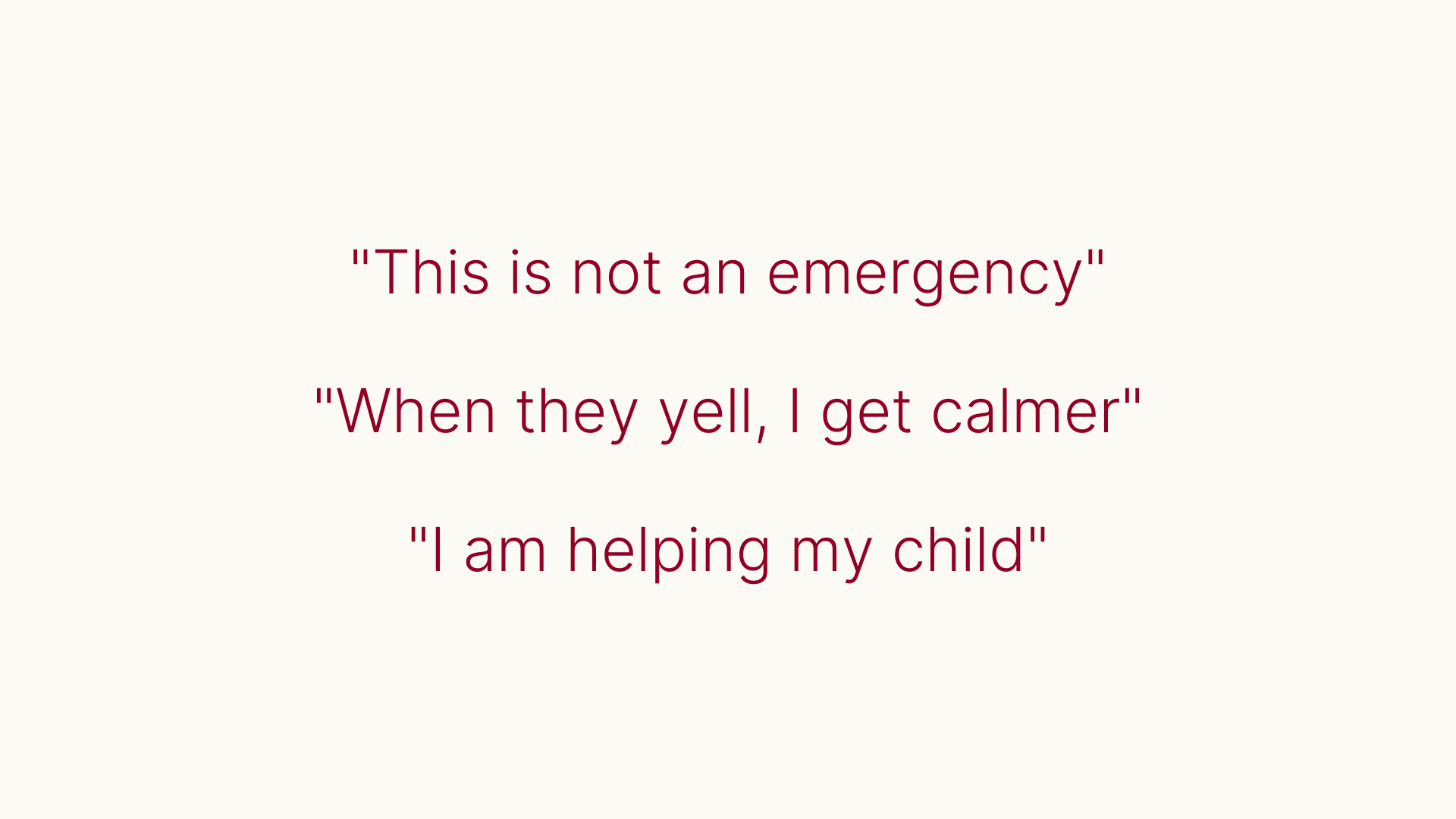
You can write down the resources that resonate with you and visualize yourself doing this new response instead of yelling. As you do, you train the brain toward this new, more skillful response.
You Can Do It
You can yell less. It takes practice and a willingness to be a little uncomfortable as you try something new. I invite you to make reducing your overall stress a priority and make a yell-less resource plan. When you do, you’ll not only experience immediate positive effects, but you’ll strengthen your relationship with your child for life.
Do you want to go deeper? I've written a whole book about changing your own autopilot reactions and creating a relationship with your child based on love and mutual respect. It's called, "Raising Good Humans," an international best-seller, and you can find it here.
To learn more about Mindful Parenting, including the Mindful Parenting C.L.E.A.R. Method, our teacher training program, and how to join the waitlist for the Mindful Parenting Membership, click here!
